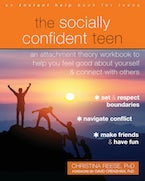By Christina Reese, PhD, author of The Socially Confident Teen
Power. It’s not a bad thing when it’s used responsibly. Respectful use of power can bring people together and create cohesiveness. It can be used by current leaders to mold and shape those coming behind them.
In a family, the use of power can be polarizing. If those in power struggle with those who are not, anger and resentment result. Parents have the power, for they are the ones responsible to provide, protect, and prepare their children for successful adult life. Parents teach—mostly through modeling—relationship, social, and emotion regulation skills. Parents are molding and shaping the next generation.
During the teen years, power struggles can abound because parents have the power in the family and teens are rising in independence and autonomy, defining their identity and seeking to have their own power. They want to make their own choices. They have their own thoughts and ideas.
The teen years are a great time to try out decision-making skills, with supervision and support. The last part of our brain to develop, in our mid-twenties, is our prefrontal cortex, the seat of decision-making. As much as teens want to stretch their brains and make their own choices, their brain is not ready to do this independently.
The best scenario is for teens to make decisions with the supervision and support of parents that they can trust. When a teen can talk a decision through with their parents, they make better choices. When they can come to their parents after making a decision that had consequences, and talk through what they could have done differently, they will make better choices. Their brain is being exercised in the area of making decisions.
Instead of power struggling, parents can power share. This allows teens to learn how to make good choices within the safety of the parent-child relationship. Power sharing can look like giving choices or compromising.
When a teen has a choice to make, offer some preapproved, safe options, and let your child choose from those. For example, if they come home from school and don’t want to do homework, offer taking an activity break (basketball game which can burn adrenaline) or a snack break (because they may need an energy boost) or help from you on the first few questions (to reconnect in relationship). Each of those choices meets a need the teen may have. They feel that they have some control over the situation because they get to make a choice.
A compromise is when each person gets some of what they want but not all of what they want. When a teen wants to go to the school basketball game and parents want them to go to a family birthday party, a compromise would allow the teen to have a voice about what was important to them. The compromise may be attending half of the game and half of the party. Recognizing that a teen is thinking for themselves and can make some choices responsibly helps them to develop healthy independence and autonomy.
Power struggles during the teen years can create ruptures in attachment at the time when children need to depend on their parents the most. The teen years can be difficult, and they need to continue to find their safe space and refuge in their parents. Keep the attachment relationship strong by avoiding power struggles, and power share instead.
Christina Reese, PhD, is a licensed clinical therapist who specializes in attachment theory. She has extensive experience with attachment trauma and adoption, working on connecting families, and building stronger relationships. Reese provides educational seminars across the country on attachment and trauma in children and families, and is author of Attachment, Puzzle Pieces, The Attachment Connection, and Trauma and Attachment.



 2024 Peace Playbook: 3 Tactics to Avoid Clashes with Your Partner
2024 Peace Playbook: 3 Tactics to Avoid Clashes with Your Partner